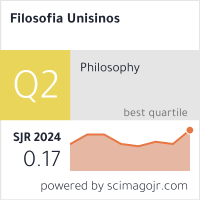Are katamenia a first potentiality or first actuality of a human?
DOI:
https://doi.org/10.4013/fsu.2022.232.04Resumen
In Aristotle’s writings regarding the biology of embryology, especially in the Generation of Animals, he contends that the mother’s menstrual fluids provide the material for the generation of the offspring, and the father’s form determines its formation as a member of that species (e.g. human). The katamenia (menstrual fluids) of the mother are said to be potentially all the body parts of the offspring, though actually none of them. So, the fluids are potentially the offspring. But are they a first potentiality or second potentiality (first actuality) of a human, in the terminology of De Anima II? In this paper I will argue that katamenia are a first potentiality of a human. My first argument is that katamenia do not have the potential for human activities such as thinking, but rather the potential of becoming something having the potential for those activities. I answer the objection that katamenia are not even a first potentiality, by appealing to an important text contending that for any x whose source of becoming is external, x is potentially y if nothing in x with respect to matter needs to be changed in order for an external principle to make x into y.
Keywords: Aristotle, katamenia, potentiality, actuality, Generation of Animals.
Descargas
Métricas
Descargas
Publicado
Cómo citar
Número
Sección
Licencia
Derechos de autor 2021 Filosofia Unisinos / Unisinos Journal of Philosophy

Esta obra está bajo una licencia internacional Creative Commons Atribución 4.0.
Concedo a revista Filosofia Unisinos – Unisinos Journal of Philosophy o direito de primeira publicação da versão revisada do meu artigo, licenciado sob a Licença Creative Commons Attribution 4.0 (que permite o compartilhamento do trabalho com reconhecimento da autoria e publicação inicial nesta revista).
Afirmo ainda que meu artigo não está sendo submetido a outra publicação e não foi publicado na íntegra em outro periódico e assumo total responsabilidade por sua originalidade, podendo incidir sobre mim eventuais encargos decorrentes de reivindicação, por parte de terceiros, em relação à autoria do mesmo.











